University Case Study: Legal and Ethical Analysis of Nursing Scenario
VerifiedAdded on 2020/05/04
|5
|1019
|280
Case Study
AI Summary
This case study provides a legal and ethical analysis of a nursing scenario, examining the concepts of privacy and confidentiality from a legal standpoint. It differentiates between the two terms and discusses the implications of the Privacy Act 1988 in Australia, highlighting cases of medical misconduct related to privacy violations. The study further explores mandatory reporting requirements for healthcare professionals, outlining notifiable conduct and exceptions. Finally, it applies these legal and ethical principles to a specific scenario involving RNs accessing a colleague's information, determining the duty to report potential breaches of privacy and professional misconduct. The analysis draws on relevant legislation and guidelines from the Australian Health Practitioner Regulation Agency (AHPRA).
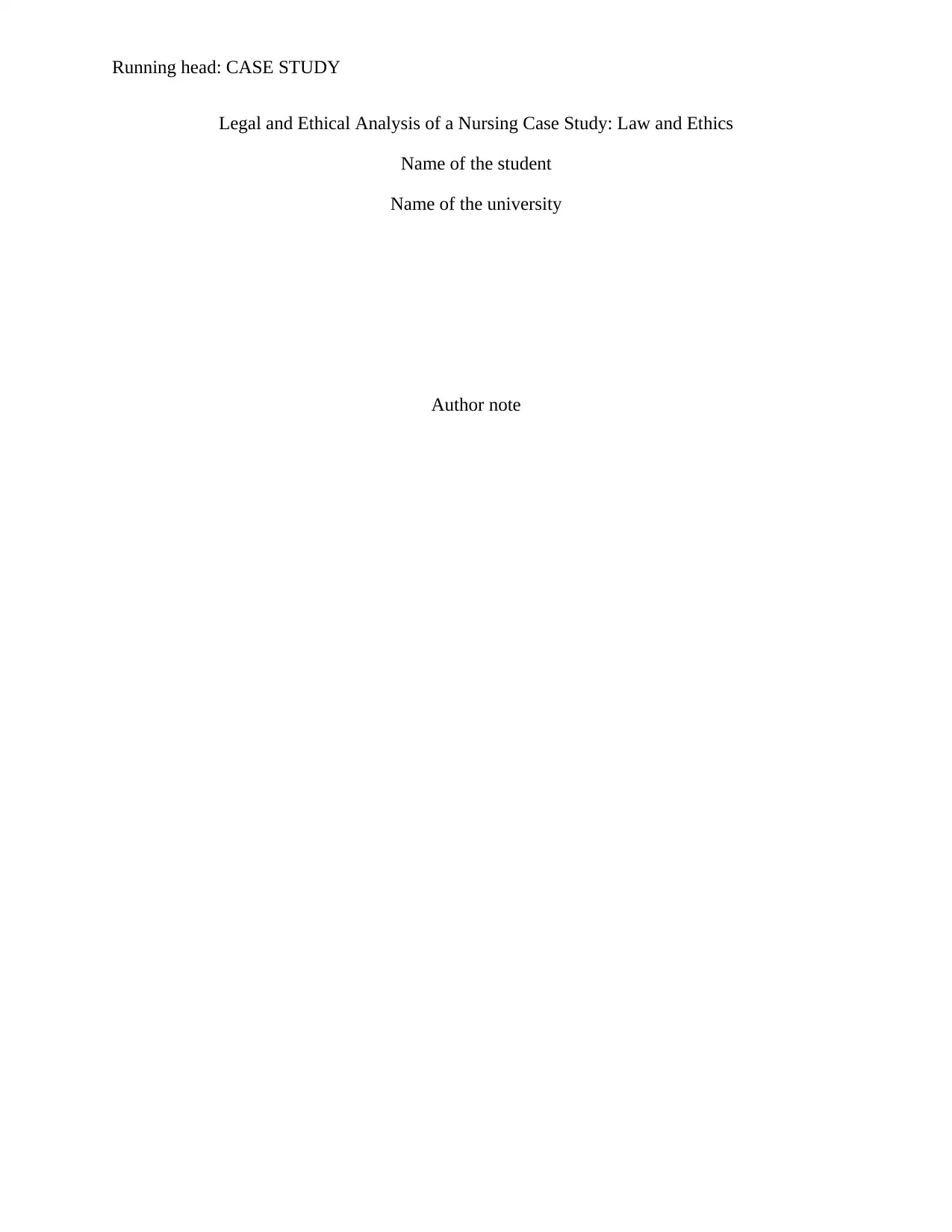
Running head: CASE STUDY
Legal and Ethical Analysis of a Nursing Case Study: Law and Ethics
Name of the student
Name of the university
Author note
Legal and Ethical Analysis of a Nursing Case Study: Law and Ethics
Name of the student
Name of the university
Author note
Paraphrase This Document
Need a fresh take? Get an instant paraphrase of this document with our AI Paraphraser
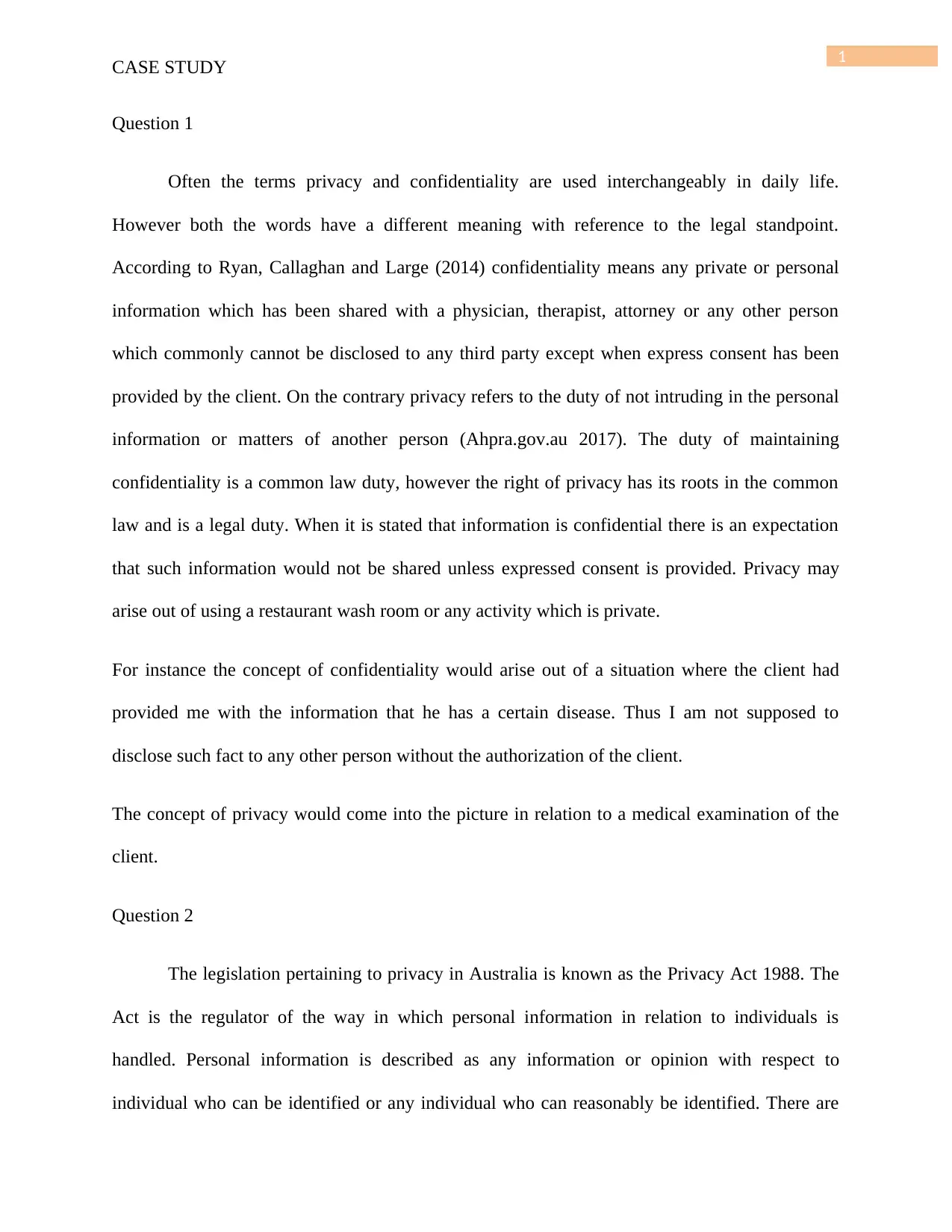
1
CASE STUDY
Question 1
Often the terms privacy and confidentiality are used interchangeably in daily life.
However both the words have a different meaning with reference to the legal standpoint.
According to Ryan, Callaghan and Large (2014) confidentiality means any private or personal
information which has been shared with a physician, therapist, attorney or any other person
which commonly cannot be disclosed to any third party except when express consent has been
provided by the client. On the contrary privacy refers to the duty of not intruding in the personal
information or matters of another person (Ahpra.gov.au 2017). The duty of maintaining
confidentiality is a common law duty, however the right of privacy has its roots in the common
law and is a legal duty. When it is stated that information is confidential there is an expectation
that such information would not be shared unless expressed consent is provided. Privacy may
arise out of using a restaurant wash room or any activity which is private.
For instance the concept of confidentiality would arise out of a situation where the client had
provided me with the information that he has a certain disease. Thus I am not supposed to
disclose such fact to any other person without the authorization of the client.
The concept of privacy would come into the picture in relation to a medical examination of the
client.
Question 2
The legislation pertaining to privacy in Australia is known as the Privacy Act 1988. The
Act is the regulator of the way in which personal information in relation to individuals is
handled. Personal information is described as any information or opinion with respect to
individual who can be identified or any individual who can reasonably be identified. There are
CASE STUDY
Question 1
Often the terms privacy and confidentiality are used interchangeably in daily life.
However both the words have a different meaning with reference to the legal standpoint.
According to Ryan, Callaghan and Large (2014) confidentiality means any private or personal
information which has been shared with a physician, therapist, attorney or any other person
which commonly cannot be disclosed to any third party except when express consent has been
provided by the client. On the contrary privacy refers to the duty of not intruding in the personal
information or matters of another person (Ahpra.gov.au 2017). The duty of maintaining
confidentiality is a common law duty, however the right of privacy has its roots in the common
law and is a legal duty. When it is stated that information is confidential there is an expectation
that such information would not be shared unless expressed consent is provided. Privacy may
arise out of using a restaurant wash room or any activity which is private.
For instance the concept of confidentiality would arise out of a situation where the client had
provided me with the information that he has a certain disease. Thus I am not supposed to
disclose such fact to any other person without the authorization of the client.
The concept of privacy would come into the picture in relation to a medical examination of the
client.
Question 2
The legislation pertaining to privacy in Australia is known as the Privacy Act 1988. The
Act is the regulator of the way in which personal information in relation to individuals is
handled. Personal information is described as any information or opinion with respect to
individual who can be identified or any individual who can reasonably be identified. There are
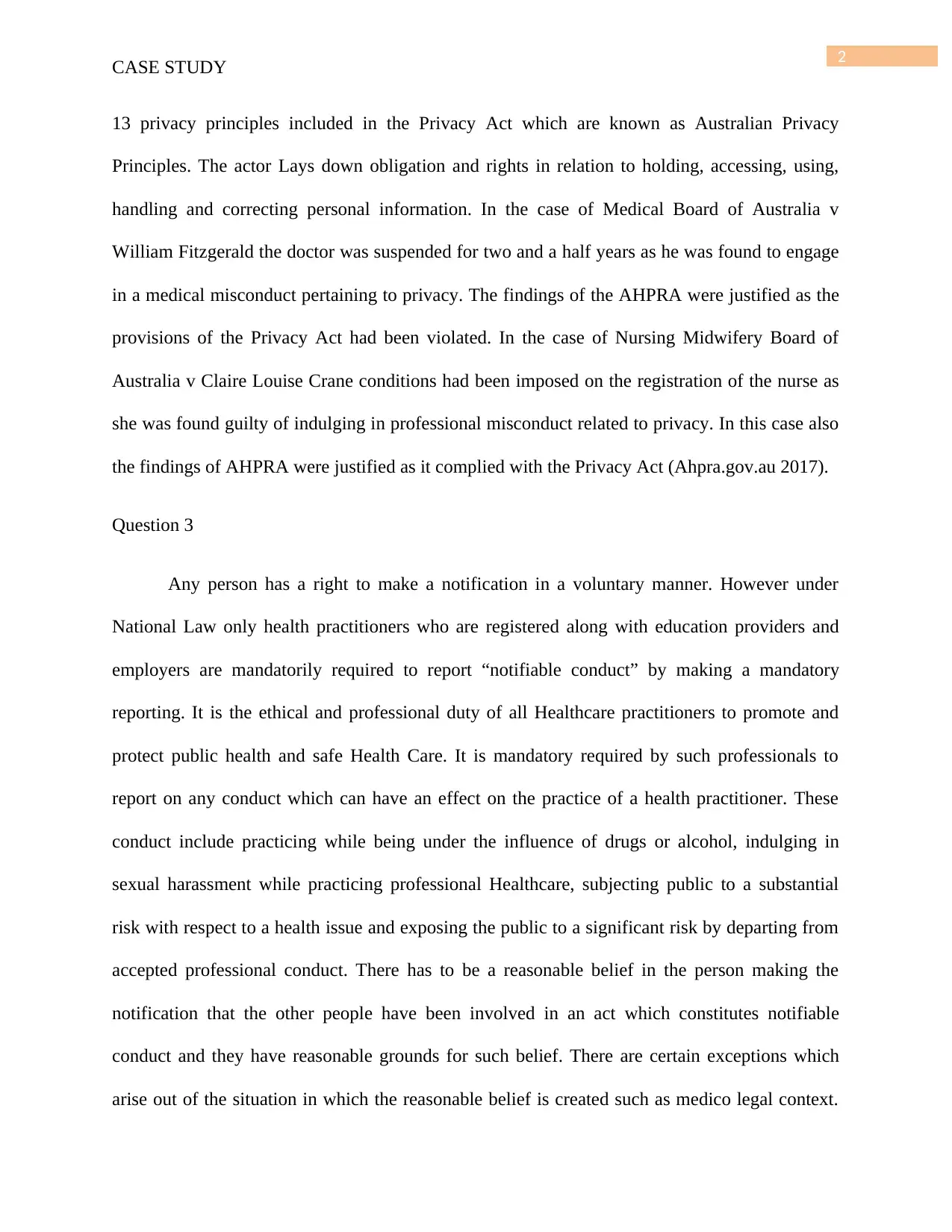
2
CASE STUDY
13 privacy principles included in the Privacy Act which are known as Australian Privacy
Principles. The actor Lays down obligation and rights in relation to holding, accessing, using,
handling and correcting personal information. In the case of Medical Board of Australia v
William Fitzgerald the doctor was suspended for two and a half years as he was found to engage
in a medical misconduct pertaining to privacy. The findings of the AHPRA were justified as the
provisions of the Privacy Act had been violated. In the case of Nursing Midwifery Board of
Australia v Claire Louise Crane conditions had been imposed on the registration of the nurse as
she was found guilty of indulging in professional misconduct related to privacy. In this case also
the findings of AHPRA were justified as it complied with the Privacy Act (Ahpra.gov.au 2017).
Question 3
Any person has a right to make a notification in a voluntary manner. However under
National Law only health practitioners who are registered along with education providers and
employers are mandatorily required to report “notifiable conduct” by making a mandatory
reporting. It is the ethical and professional duty of all Healthcare practitioners to promote and
protect public health and safe Health Care. It is mandatory required by such professionals to
report on any conduct which can have an effect on the practice of a health practitioner. These
conduct include practicing while being under the influence of drugs or alcohol, indulging in
sexual harassment while practicing professional Healthcare, subjecting public to a substantial
risk with respect to a health issue and exposing the public to a significant risk by departing from
accepted professional conduct. There has to be a reasonable belief in the person making the
notification that the other people have been involved in an act which constitutes notifiable
conduct and they have reasonable grounds for such belief. There are certain exceptions which
arise out of the situation in which the reasonable belief is created such as medico legal context.
CASE STUDY
13 privacy principles included in the Privacy Act which are known as Australian Privacy
Principles. The actor Lays down obligation and rights in relation to holding, accessing, using,
handling and correcting personal information. In the case of Medical Board of Australia v
William Fitzgerald the doctor was suspended for two and a half years as he was found to engage
in a medical misconduct pertaining to privacy. The findings of the AHPRA were justified as the
provisions of the Privacy Act had been violated. In the case of Nursing Midwifery Board of
Australia v Claire Louise Crane conditions had been imposed on the registration of the nurse as
she was found guilty of indulging in professional misconduct related to privacy. In this case also
the findings of AHPRA were justified as it complied with the Privacy Act (Ahpra.gov.au 2017).
Question 3
Any person has a right to make a notification in a voluntary manner. However under
National Law only health practitioners who are registered along with education providers and
employers are mandatorily required to report “notifiable conduct” by making a mandatory
reporting. It is the ethical and professional duty of all Healthcare practitioners to promote and
protect public health and safe Health Care. It is mandatory required by such professionals to
report on any conduct which can have an effect on the practice of a health practitioner. These
conduct include practicing while being under the influence of drugs or alcohol, indulging in
sexual harassment while practicing professional Healthcare, subjecting public to a substantial
risk with respect to a health issue and exposing the public to a significant risk by departing from
accepted professional conduct. There has to be a reasonable belief in the person making the
notification that the other people have been involved in an act which constitutes notifiable
conduct and they have reasonable grounds for such belief. There are certain exceptions which
arise out of the situation in which the reasonable belief is created such as medico legal context.
⊘ This is a preview!⊘
Do you want full access?
Subscribe today to unlock all pages.

Trusted by 1+ million students worldwide
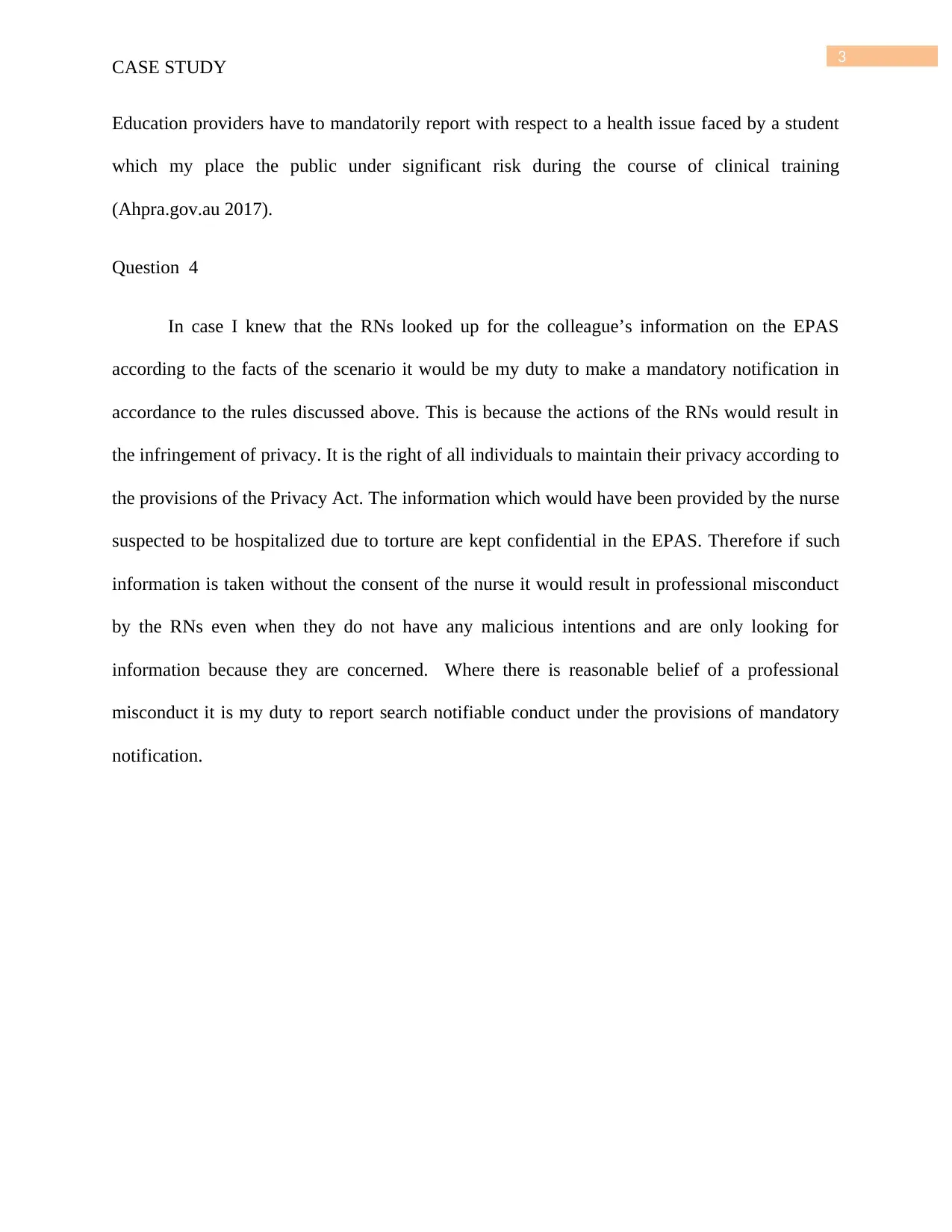
3
CASE STUDY
Education providers have to mandatorily report with respect to a health issue faced by a student
which my place the public under significant risk during the course of clinical training
(Ahpra.gov.au 2017).
Question 4
In case I knew that the RNs looked up for the colleague’s information on the EPAS
according to the facts of the scenario it would be my duty to make a mandatory notification in
accordance to the rules discussed above. This is because the actions of the RNs would result in
the infringement of privacy. It is the right of all individuals to maintain their privacy according to
the provisions of the Privacy Act. The information which would have been provided by the nurse
suspected to be hospitalized due to torture are kept confidential in the EPAS. Therefore if such
information is taken without the consent of the nurse it would result in professional misconduct
by the RNs even when they do not have any malicious intentions and are only looking for
information because they are concerned. Where there is reasonable belief of a professional
misconduct it is my duty to report search notifiable conduct under the provisions of mandatory
notification.
CASE STUDY
Education providers have to mandatorily report with respect to a health issue faced by a student
which my place the public under significant risk during the course of clinical training
(Ahpra.gov.au 2017).
Question 4
In case I knew that the RNs looked up for the colleague’s information on the EPAS
according to the facts of the scenario it would be my duty to make a mandatory notification in
accordance to the rules discussed above. This is because the actions of the RNs would result in
the infringement of privacy. It is the right of all individuals to maintain their privacy according to
the provisions of the Privacy Act. The information which would have been provided by the nurse
suspected to be hospitalized due to torture are kept confidential in the EPAS. Therefore if such
information is taken without the consent of the nurse it would result in professional misconduct
by the RNs even when they do not have any malicious intentions and are only looking for
information because they are concerned. Where there is reasonable belief of a professional
misconduct it is my duty to report search notifiable conduct under the provisions of mandatory
notification.
Paraphrase This Document
Need a fresh take? Get an instant paraphrase of this document with our AI Paraphraser
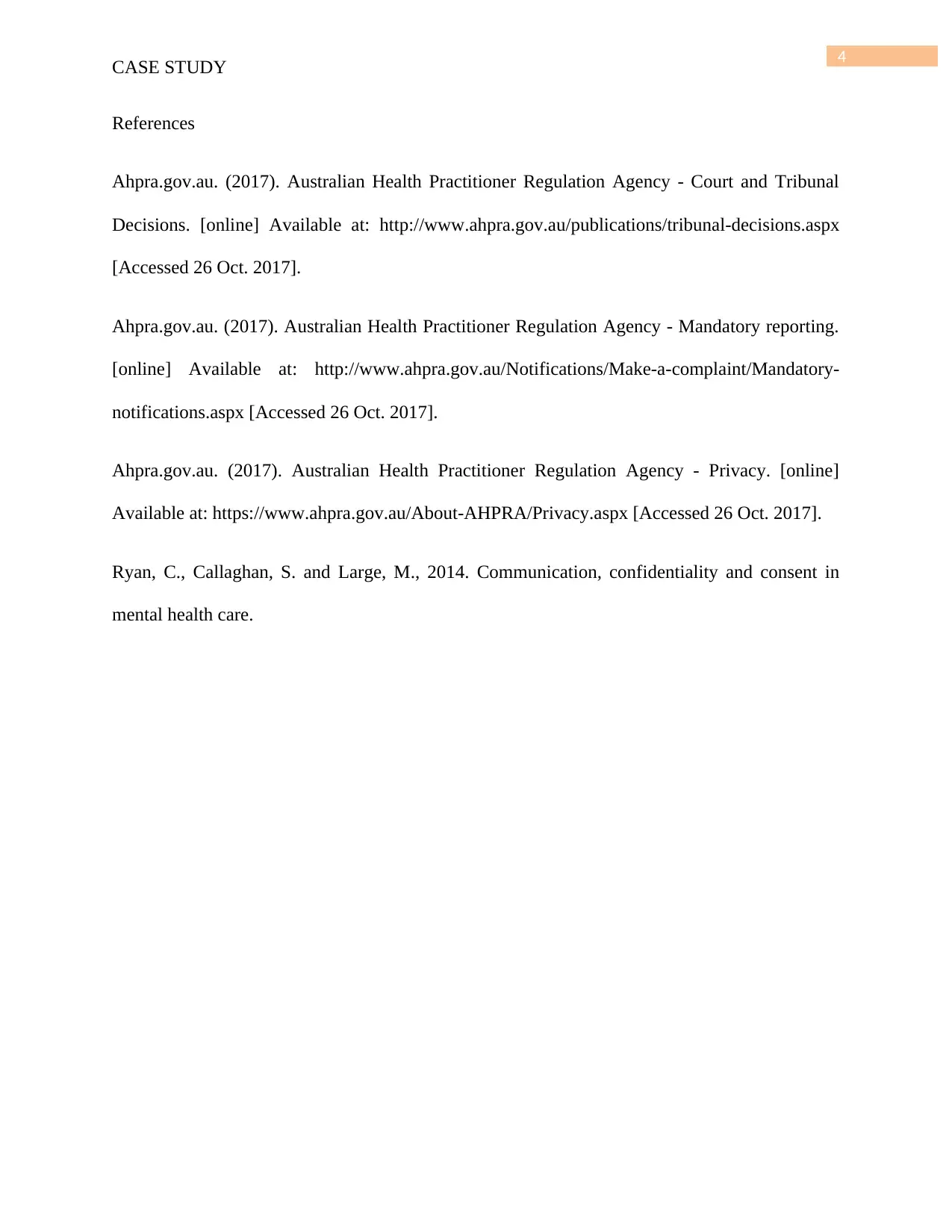
4
CASE STUDY
References
Ahpra.gov.au. (2017). Australian Health Practitioner Regulation Agency - Court and Tribunal
Decisions. [online] Available at: http://www.ahpra.gov.au/publications/tribunal-decisions.aspx
[Accessed 26 Oct. 2017].
Ahpra.gov.au. (2017). Australian Health Practitioner Regulation Agency - Mandatory reporting.
[online] Available at: http://www.ahpra.gov.au/Notifications/Make-a-complaint/Mandatory-
notifications.aspx [Accessed 26 Oct. 2017].
Ahpra.gov.au. (2017). Australian Health Practitioner Regulation Agency - Privacy. [online]
Available at: https://www.ahpra.gov.au/About-AHPRA/Privacy.aspx [Accessed 26 Oct. 2017].
Ryan, C., Callaghan, S. and Large, M., 2014. Communication, confidentiality and consent in
mental health care.
CASE STUDY
References
Ahpra.gov.au. (2017). Australian Health Practitioner Regulation Agency - Court and Tribunal
Decisions. [online] Available at: http://www.ahpra.gov.au/publications/tribunal-decisions.aspx
[Accessed 26 Oct. 2017].
Ahpra.gov.au. (2017). Australian Health Practitioner Regulation Agency - Mandatory reporting.
[online] Available at: http://www.ahpra.gov.au/Notifications/Make-a-complaint/Mandatory-
notifications.aspx [Accessed 26 Oct. 2017].
Ahpra.gov.au. (2017). Australian Health Practitioner Regulation Agency - Privacy. [online]
Available at: https://www.ahpra.gov.au/About-AHPRA/Privacy.aspx [Accessed 26 Oct. 2017].
Ryan, C., Callaghan, S. and Large, M., 2014. Communication, confidentiality and consent in
mental health care.
1 out of 5
Related Documents
Your All-in-One AI-Powered Toolkit for Academic Success.
+13062052269
info@desklib.com
Available 24*7 on WhatsApp / Email
![[object Object]](/_next/static/media/star-bottom.7253800d.svg)
Unlock your academic potential
Copyright © 2020–2026 A2Z Services. All Rights Reserved. Developed and managed by ZUCOL.





